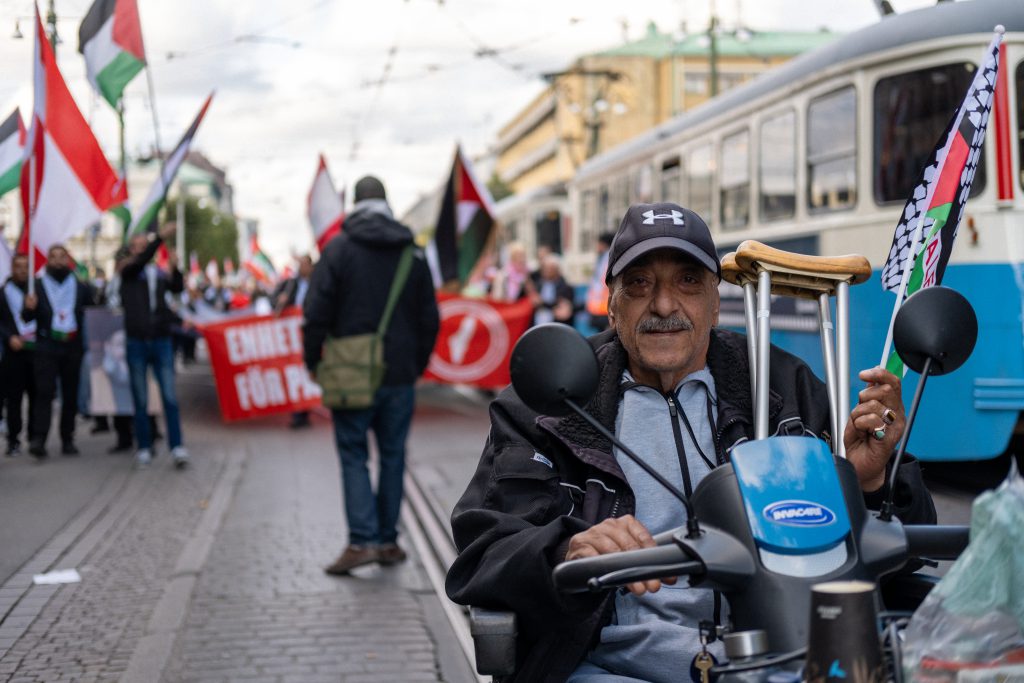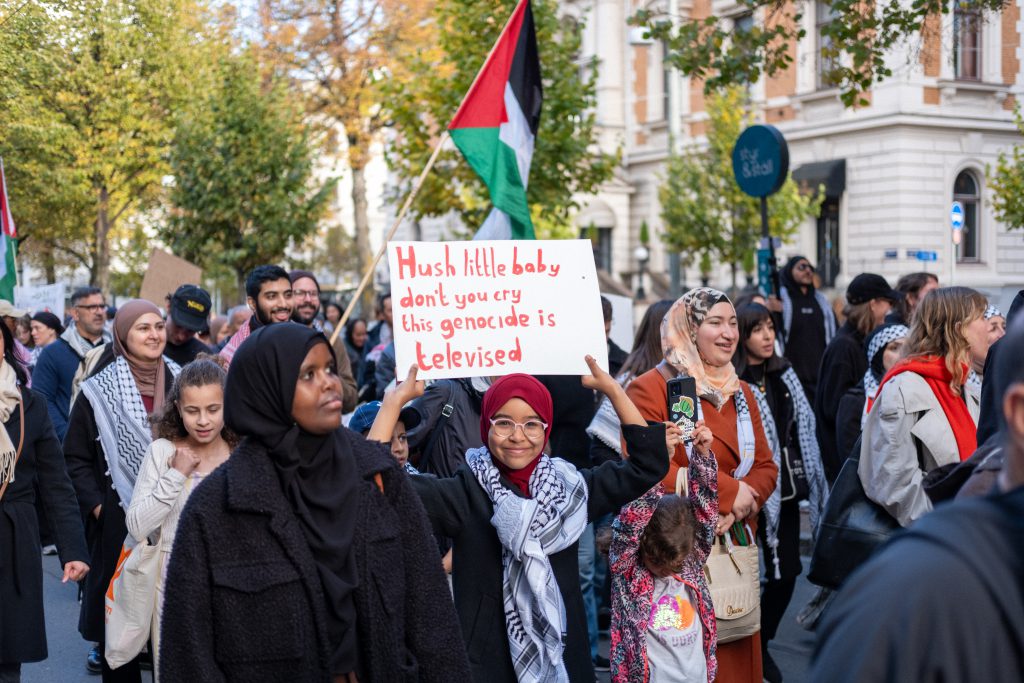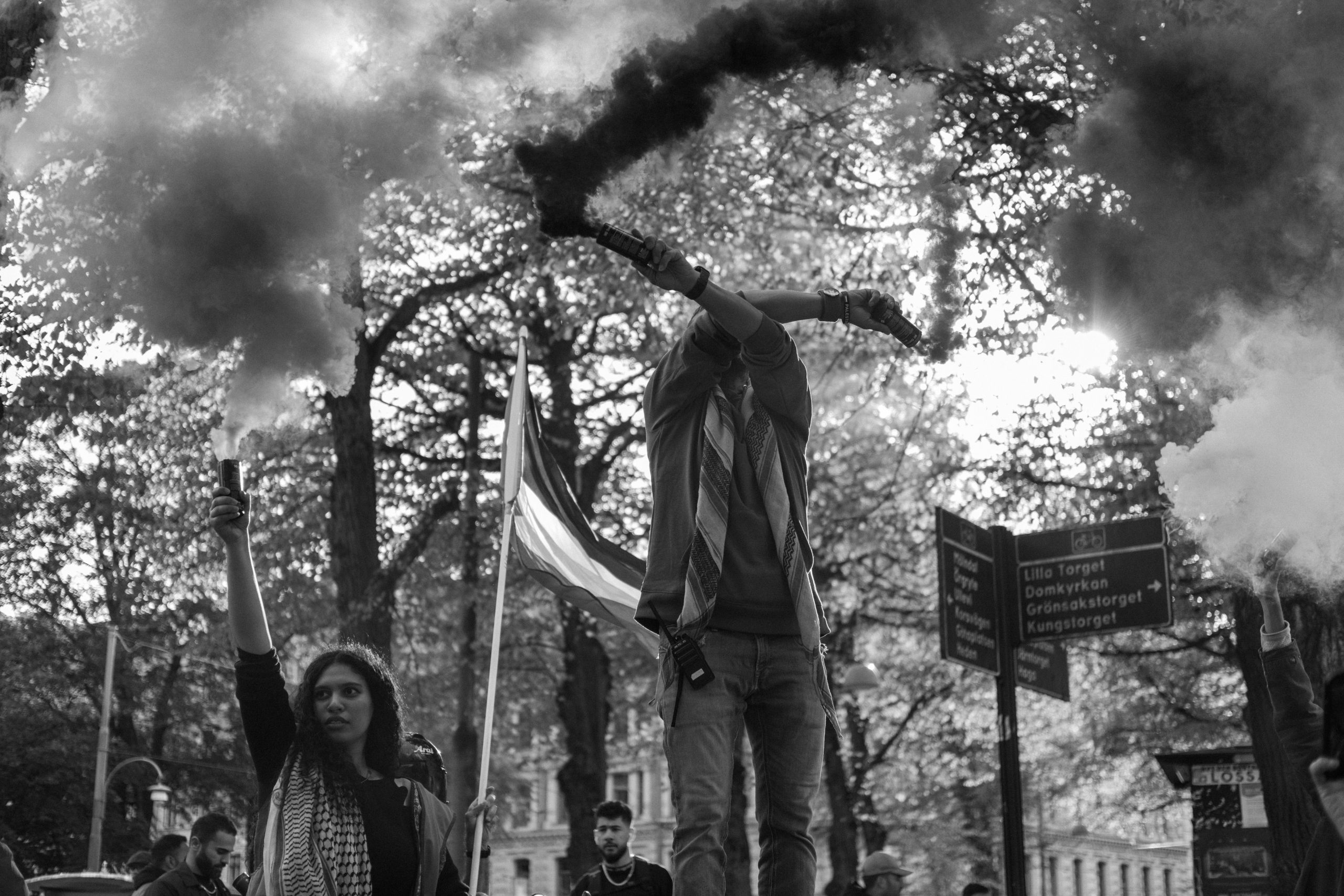It’s been over a year since October 7, 2023. Since then, Gaza has suffered from Israeli imposed massacres, bombings, forced displacement, gender-based violence, and starvation, following Hamas’ attack. The Lemkin Institute for Genocide Prevention and Human Security classified these actions as genocidal as early as October 13, 2023, and the global pro-Palestinian movement has been strongly protesting ever since.
The movement for the liberation of Palestine and an end to Israeli occupation and colonization has a 75-year-long history. Yet, in the past year, it has once again come to the forefront in Europe. Pro-Palestinian activism has taken different forms depending on local contexts, with each movement shaped by the political landscape and histories of the Palestinian communities in those countries.
My name is Clau. I’m an educator, activist, and researcher based in Vienna, and in this blog, I’ll give you a glimpse into the pro-Palestinian activism happening here in Austria.
A Focus on Vienna
In this first post, I’ll discuss Vienna’s political climate, focusing on the repression of pro-Palestinian activism. Future posts will feature activists’ experiences with both online and offline repression. Through these stories, we’ll explore the broader bias against the pro-Palestinian movement in the Austrian context.

Events on October 7, 2024
On October 7, 2024, three different vigils took place across Vienna. The Palestinian community held a vigil for victims in Palestine and Lebanon. The Jewish community honored the victims of Hamas’ October 7, 2023 attack. Meanwhile, Standing Together hosted a vigil for both Palestinian and Israeli civilians. These gatherings reflect the deeply polarized discourse on Palestine, dividing the city into three distinct “camps.”
The real issue with this polarization isn’t the existence of different opinions, but rather the censorship and repression faced by the pro-Palestinian side. This suppression of dialogue divides the social justice front and strengthens Austria’s ongoing support for Israeli genocidal policies.
For example, after the pro-Palestinian vigil, a group of activists—including Black and Jewish individuals—faced a hate crime. A man hurled racial and antisemitic slurs at them, using the N-word and K-word, in plain view. Shockingly, bystanders did nothing. How can a city with such a significant Nazi past and a legacy as the capital of a former empire tolerate such open hostility against activists standing up against genocide?
Vienna’s Political Landscape
Understanding Vienna’s political context requires looking at its post-war history. Like Germany, Austria built its post-Holocaust state on strong support for Israel and a commitment to its security. However, this has occurred alongside rising antisemitism, Islamophobia, and anti-Arab and anti-refugee sentiment, particularly after the right-wing surge in recent elections.
In 2023, Dokustelle Österreich recorded 1,522 racist attacks against Muslims or those perceived as Muslim—double the cases reported the previous year. Similarly, the Jewish Community Vienna’s 2023 Antisemitism Report showed a 60% rise in antisemitic incidents, largely linked to right-wing extremism.
Defining Antisemitism
A significant point of contention in Vienna revolves around the definition of antisemitism. The Jewish community’s report often equates antisemitism with anti-Zionism or criticism of Israel. It even labels the BDS movement (Boycott, Divestment, Sanctions) as antisemitic. Furthermore, the report divides antisemitic motives into right-wing, left-wing, and Muslim categories, implying that being Muslim itself leads to antisemitism, regardless of political views.
In 2017, Austria endorsed the IHRA Working Definition of Antisemitism, and in 2020, the Austrian parliament, like Germany, condemned the BDS movement as antisemitic. This broad labeling of criticism as antisemitism leads to the repression of pro-Palestinian activism, resulting in canceled events and banned demonstrations.
In Austria, pro-Israeli views are mainstream, while support for Palestine is considered radical or even antisemitic.
The Myth of “Imported Antisemitism”
In German-speaking countries, the narrative of “imported antisemitism” shifts the focus of antisemitism onto migrant communities, particularly Arabs and Muslims. This narrative is used to silence criticism of Israel, deflecting attention from right-wing antisemitism.
Austria also weaponizes the fight against antisemitism to distance itself from its Nazi past, identifying with Jewish victims rather than recognizing its role in historic atrocities, including the Holocaust and imperialism. This weaponization often results in the silencing of pro-Palestinian voices. Ironically, the philosemitism performed by the state is itself antisemitic, as it homogenizes Jews under a Zionist banner, sidelining Jewish anti-Zionist dissenting voices.

Islamophobia and Anti-Terrorism
In 2020, Austrian police launched Operation Luxor, raiding 70 Muslim households in a heavily criticized anti-terror sweep. Muslim-led institutions, charities, and scholars were targeted, sparking outrage from human rights groups who condemned the raids as politically motivated by Islamophobia. Cage International reports that “to date, no-one affected by the raids has been charged for any offence […] and Austrian courts have declared the raids unlawful”.
Another controversial action came from the University of Vienna with its Islam Map, which lists mosques and Muslim organizations in the city. By putting the entire Muslim community under the suspicion of radicalization, the map fuels right-wing rhetoric.
Just as accusations of antisemitism are used to silence pro-Palestinian voices, the label of terrorism is used as a tool of moral panic. This labeling casts all Muslims, particularly young men, as potential terrorists, giving the state justification to surveil and punish the entire community. These intertwined dynamics of Islamophobia and accusations of antisemitism are key mechanisms of anti-Palestinian repression.
Breaking the Silence
In the words of Author Collective scăpa دهاش:
“Silence, if not broken, sustains institutionally whitewashed and pinkwashed narratives of the course of events. A cancellation, as a structure of silencing, is in a way not really an event at all: neither isolated nor exceptional, it has no clear temporal or spatial boundaries but is embedded in the materiality of an architecture that attempts to delimit discursive-political intelligibility”
The purpose of this blog is to break that silence. By interviewing pro-Palestinian activists in Vienna, I hope to shed light on how repression functions both online and offline. Their experiences offer one side of the story, and by sharing them, I hope to contribute to a more informed dialogue about pro-Palestinian activism in Vienna.
Clau Tatangelo
References
Author Collective scăpa دهاش
(2024) Witnessing the Architecture of a Cancellation: The Silencing of Voices on Palestine in Austrian Academia, Middle East Critique, 33:3, 377-395.
Klaudia Wieser (2024) in Sayigh Rosemary. Becoming Pro-Palestinian: Testimonies from the global solidarity movement. I.B. Taurus
